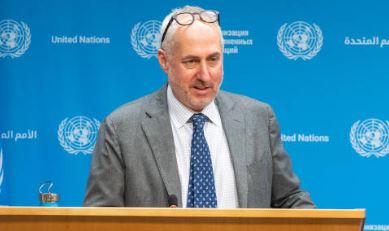The UN has said thatconflict-related displacement of people and the spread of cholera continued to increase humanitarian needs across Sudan.
Stephane Dujarric, the spokesperson for Secretary-General António Guterres, expressed the sentiments in his Wednesday briefing.
Dujarric said the International Organization for Migration (IOM) had reported that nearly 9,700 people in Khartoum State alone were recently displaced from Al Salha in Um Durman locality due to conflict.
Many of them, he went on, remained within Um Durman, while others moved north to Karrari District which is still in Khartoum State but the security situation there is fluid.
Dujarric cited IOM reporting that more than 9,000 people fled South Kordofan’s Dibebat town in Al Quoz locality last week due to intense clashes. The situation remains volatile.
IOM, Dujarric further said, reported that about 600 people were displaced from Abu Shouk camp and El Fasher town in North Darfur State just last week, with most of them seeking refuge within El Fasher. Others moved to localities in North Darfur, including, Tawila where the UN and partners have been scaling up assistance for new arrivals, despite significant gaps due to shortfalls in resources and challenges in getting partners on the ground in sufficient numbers.
On the cholera outbreak, he disclosed that daily cases were falling in Khartoum State, but they were steadily increasing in the north, in River Nile State.
“In the past two weeks alone, health authorities there have reported more than 180 cumulative cases and four deaths. Most of the cases were concentrated in the localities of Atbara, Barbar and Damar. And of the total cases, 55 were reported to have arrived from other states – including 45 from Khartoum and Um Durman – underscoring the cross-regional spread of the disease.
“Partners warn that continued displacement, damaged infrastructure, and limited access to safe water are accelerating transmission,” he said.
Meanwhile, the UN humanitarian colleagues were warning that thousands of displaced people were now returning to Blue Nile State and needed urgent assistance. They say the people lacked food, clean water, health care, shelter and education.
Humanitarian organizations were reportedly working hard to meet the growing needs of the people, but insecurity, access constraints and critical funding shortfalls continued to undermine the response.
The UN once again called for an immediate cessation of hostilities, unimpeded humanitarian access across borders and conflict lines, the protection of civilians, as well as increased funding.




